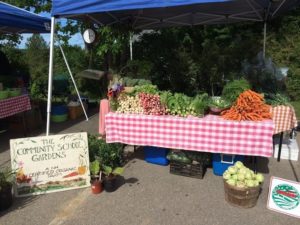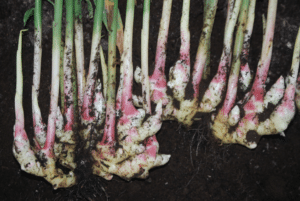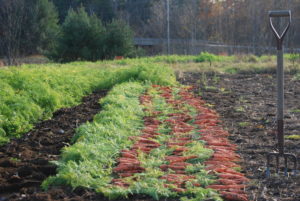Young Farmers Work Together in the Community School’s Young Farmer Transition Program
By John Welton
For years now, aspiring young farmers have found a patch of land in the foothills of New Hampshire’s White Mountains where they can deepen their farming experience. The Community School provides two-and-a-half acres of cultivated garden space for the motivated individual to grow produce for sale through a small (30-40) member CSA program, a thriving farmers market in the town of Tamworth, and any wholesale accounts he or she chooses to develop. As a salaried staff member, this position offers a unique opportunity to gain knowledge, save a little money, and contribute meaningfully to the organization in its role as an alternative educator and local foods provider.
Despite all these positives, the farm manager’s position has seen a consistent turnover every two seasons for at least the last eight years. In a small community built on long-term, reliable commitment, having farmers passing through like this risks leaving a void in the social and financial fabric of the school. Such a void limits the farm’s ability to achieve high visibility during the summer months marketing produce and serve as a source of income to the school in the months it is not receiving tuition payments from students. In addition to many other benefits, these, if gone, would affect significant financial stress on the school and negative social change within the community. This situation has generated plenty of discussion as to why farmers aren’t sticking around. Perhaps the pay is not competitive enough; the stress load is simply too much; the inexperienced farmers don’t like farming as much as they thought; or, farming at the school is nice, but they would rather farm on their own. Although each idea is valid, experience shows that they—and various other reasons, too—are all interrelated. The solving of one will not create the perfect conditions for a permanent farm manager, nor is solving them all a realistic project.
The 2014 season marked the first attempts to address these concerns through a transitional leadership program designed to have the outgoing and incoming farm managers work alongside one another for the entire season. Overlapping the tenure of each manager like this is crucial to the success of the transition. The pattern over the last eight years has shown us that each new farmer pursues his or her own projects, based on his or her unique interests, and therefore takes the farm in a different direction from the previous farmer, whether that is through constructing a greenhouse, planting an orchard, or diversifying farm income with a new business idea. While these efforts all represent dynamic and stimulating change, the abrupt shift in leadership every other season can stall or even prevent momentum from building over time. The limited transfer of knowledge and experience between managers that results has repeated itself as spring begins, the pace of life quickens, and our individual lives get busy. In response to this reality, one of the main motivations underlying the idea of a farmer transition was to enable the effective sharing of site-specific knowledge as well as the rationale behind broader organizational decisions that would continue to affect future farm managers. Through the transitional process, the incoming farmer’s understanding of his or her work environment and all its complexities will have the filter of an experienced peer. If done successfully, the teamwork will enhance each successive farmer’s ability to manage farm productively, extending the school’s success in building local agriculture over time.

The Community School’s booth at the Tamworth, NH, farmer’s market. June 2014. Photo by Hannah Fleischmann
By establishing this transitional model, the Community School has deliberately embraced the reality of regular farmer turnover. It is an attempt to practice a conceptual model of shared leadership, grounded in the belief that by working together two individuals can more effectively manage what a single farmer would otherwise find overwhelming. It demonstrates a proactive approach to the less-than-ideal situation of farm managers coming and going frequently, as well as sound business planning: co-leadership on the farm serves as a form of long-term risk management for an organization that is practicing the inherently risky business of farming. For example, the critical step of annual farm planning will now have the insight of an incoming manager who has had an entire season’s worth of experience before assuming head manager responsibilities, not to mention the countless opportunities to discuss preparation and methodology as both farmers work in the field. Incoming farmers will add their own layers of effort and ideas to an established pattern, rather than having to invent their own patterns over an existing, but incoherent, mix of past actions.
For successful farming to happen at the Community School, the building of a new farmer’s confidence is just as important as the building of the soil. The transitional model facilitates the planning and decision-making process through farmer collaboration. First-year managers have always had and will continue to have the responsibility of understanding the current systems and nuances of the farm; while second-year, outgoing managers will now have the responsibility of passing on their records, practices, and any knowledge gleaned from their tenure to their co-worker. It is a way to institutionalize accountability, to make one aware that their actions do not take place in a vacuum, and to recognize that cooperation over time will yield countless benefits not only for the school and the farm itself, but also for the farmers who have been, are, and will become the stewards of that piece of land.
The Community School has become a training ground for young, energetic people trying to see whether or not farming is the path they should follow in life. Creating a sense of place, rooted in the shared goal of supporting the next generation of small farmers, would enhance the school’s ability to continue attracting future farm managers while improving their chances of success when working here.

School allows farm managers to follow their own interests. In 2013 and 2014, we grew ginger for sale. Photo by John Welton
On the practical side of things, to have a program that formally organizes the reality of transient or transitional farmers will enable stability and long-term planning for both the farm and school. Regardless of any formalities, however, farm managers gain incredible experience while working at the Community School. The welcoming community, consistent customer base, and stunning landscape impart a real sense of purpose and pleasure to those lucky enough to work there. Sustaining such a project requires the ability to see not only what works, but also what could be improved. The school’s effort in 2014 to initiate a farm manager transition program began with looking inward and recognizing the need for perpetuating success over many seasons – the need for stability. Having farm managers work alongside one another has had a positive initial season. May there be many more to come.
For more information, contact the Community School: info@communityschoolnh.org, farm@communityschoolnh.org, or (603) 323-7000.
John Welton and Emma Schroeder managed the Community School Farm in 2013 and 2014. They now live in Old Town, Maine. They can be reached at (207) 581-8942 or contact the author at jcwelt@hotmail.com.


